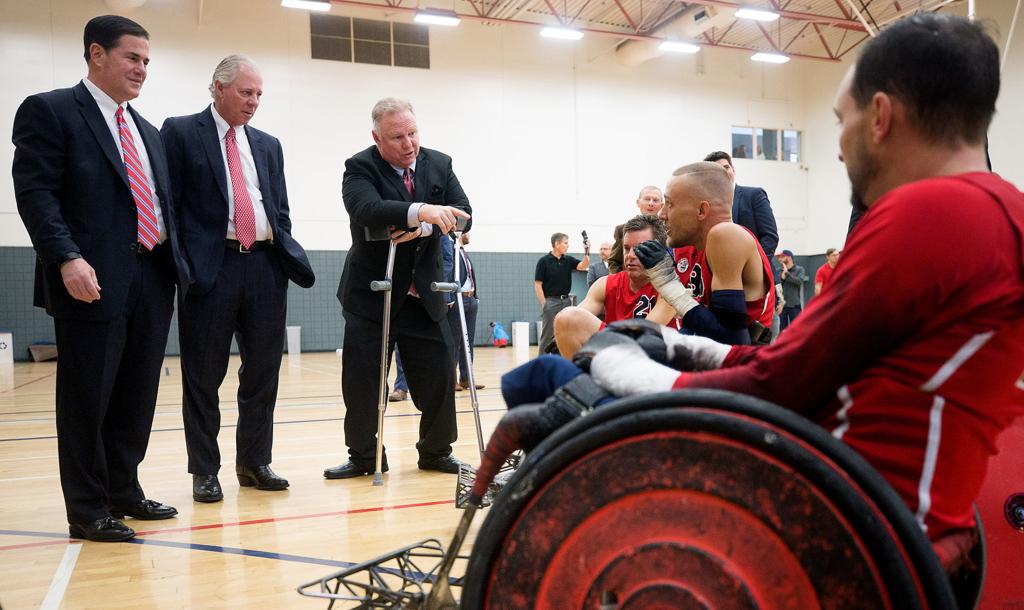Registration
By registering for the 2025 Conquerors Paragolf Championship (CPC), you acknowledge and agree with all of the terms and conditions set forth by the Competition Committee in this document.
An accepted registration is a guarantee that you made the field. Registration began on 11/1/2024
Entry Fee is $350
Registration will end on February 15th
The final field of 72 players will be confirmed by February 25th. When player is confirmed, your card on file will be charged.
WR4GD PASS REQUIRED
The CPC has been accepted and recognized as a WR4GD official event and points will be awarded accordingly. You must have a WR4GD Pass before you can register. Any registrations with the access pass will not be accepted.
WR4GD pass can be obtained through EDGA. ( EDGAgolf.com )
WR4GD Impairments
There will be NO self-classifying for the 2025 Championship.
(If you do not meet the criteria for such sport class (at the sole discretion of CPC), you will be competing overall only)
We will use the impairment assessed per WR4GD for impairment categories.
Awards will be given out for the winner and runner-up in each category, provided we have at least three entries in each category. If we do not get at least three entries for each category, CPC reserves the right (in its sole discretion) to combine categories to meet the minimum requirements.
Failure to provide correct information may result in your registration not being accepted or ultimately rejected.
Refund Policy
Full refunds will be granted until January 15, 2025 at 12:00 pm.
January 16th– February 2nd Full refunds (minus a $75 Processing Fee) will be granted.
February 3rd until March 3rd Full Refunds (minus a $150 Processing Fee) will be granted
Tentative Schedule of Events
Sunday April 6th On-Site Registration, Practice Round, Adaptive Clinic and Skills Challenge
Monday April 7th, First Round with Reception immediately following
Tuesday April 8th, Second Round
Wednesday April 9th, Final Round followed with dinner and trophy presentation
RELEASE & WAIVER AGREEMENT – ACCEPTANCE OF RISK, WAIVER & RELEASE OF RIGHTS, USE OF NAME OR LIKENESS & ACCEPTANCE OF POLICIES (Players, Caddies, and Spectators – All terms below are intended to bind me, and if applicable, all caddies, parents, and other relatives when used,
Minor – In the event this is for a minor, you are representing that you are the minor’s parent or legal guardian, that you have the legal right to represent them, and that you agree to bind your child or guarded minor to this agreement.
Consideration – In exchange for the intangible value I will gain by attending and/or participating in the “Event” (any competition conducted by the “Conquerors Paragolf” staff, Scottsdale Golf Group, Orange Tree Golf Resort, Sponsors or volunteers), and other good and valuable consideration, the receipt and sufficiency of which I hereby acknowledge, I agree to the following terms and policies related to my participation in the CPC conducted Event:
Acceptance of Risk – I understand that there are certain risks inherent in the game of golf and that (a) my participation in the Event may result in serious injury or death. I accept any and all risks, including those from lightning, golf cart accidents, and being struck by golf balls and equipment. I may also be exposed to viruses or infections that could be dangerous or deadly; (b) I am responsible to make my own decisions; (c) I further acknowledge that I am voluntarily participating in the Event with knowledge of all potential dangers and hereby agree to accept and assume any and all risks of injury, disease, infection, or death, even if caused by the negligence of CPC, “Conquerors Paragolf” staff, Scottsdale Golf Group, Orange Tree Golf Resort, Sponsors or volunteers), or their affiliates, sponsors and partners.
Personal Property- CPC and Orange Tree Golf Resort are not responsible for the loss or theft of or damage to personal property on the Club’s premises, whether held in storage or not. This includes but is not limited to personal Golf Carts, golf clubs, golf bags, golf accessories, money or other property. The player will take all precautions to avoid loss or theft of, or damage to, personal property. In the event of such loss, or damage, the player agrees to hold the Orange Tree Golf Resort, Scottsdale Golf Group, CPC and it’s Sponsors, and volunteers harmless from and against any and all claims, actions, costs, expenses and demands in respect to such theft, loss or damage, however caused, arising out of or in connection with the use of the club.
Waiver of Liability and Claims – I hereby waive and release any and all claims and liabilities, now known or hereafter known, against the Orange Tree Golf Resort, Scottsdale Golf Group, CPC and it’s Sponsors, their members, officers, directors, employees, volunteers, and all of their successors and assigns on account of injury, disease, infection, death, and property theft or damage, due to my presence at the Event, whether arising out of negligence or otherwise.
Agreement to the Use of my Name or Likeness – I hereby grant the Orange Tree Golf Resort, Scottsdale Golf Group, CPC, and it’s Sponsors the irrevocable and permanent right to the use of my name and any images of me in all forms, for promotion or otherwise without my approval or any compensation.
Agree not to Sue – I agree to not bring any claims against the Orange Tree Golf Resort, Scottsdale Golf Group, CPC and it’s Sponsors, their members, officers, directors, employees, volunteers, sponsors, partners and all of their successors bind myself, spouse, assigns and heirs without limitation and this agreement is deemed to be a WAIVER, RELEASE, DISCHARGE AND COVENANT NOT TO SUE.
Agree not to Terminate & Enforceability – I agree that I cannot terminate or rescind this Release & Waiver. If any term or provision of this Release & Waiver is unenforceable in any jurisdiction, such un-enforceability will not affect any other term or provision of this Release & Waiver.
Binding Agreement – This Release & Waiver is binding on and inures to the benefit of our respective heirs and successors. All matters arising out of this Release & Waiver shall be governed by and construed in accordance with the laws of the State of Arizona, or State of Arizona without giving effect to any choice or conflict of law provision or rule (whether of the State of Arizona, Wyoming or any other jurisdiction). Any claim or cause of action arising under this Release & Waiver may be brought only in the federal and state courts located in Maricopa County Arizona, and I hereby irrevocably consent to the exclusive jurisdiction of such courts.
Voluntary Participation and Acceptance I acknowledge that I am at least 18 years of age and that I have read and understood all of the terms of this Release & Waiver and that I am voluntarily giving up substantial legal rights, including the right to sue any party to this agreement. I acknowledge I have the right to refuse to accept this Release & Waiver and the CPC has the right to refuse to let me participate if I do not accept the Release & Waiver.
If the person is under 18 years of age – If I am the parent or legal guardian of the minor applying, I have the legal right to consent to and, I hereby do consent to the terms and conditions of this Release & Waiver. I acknowledge I have the right to refuse to accept this Release & Waiver and the CPC has the right to refuse to let my child participate if I do not accept this Release & Waiver.
WAIVER/RELEASE FROM LIABILITY AND PLAYER/SPECTATOR ASSUMPTION OF RISK (INCLUDING COMMUNICABLE DISEASES)
ASSUMPTION OF RISK / WAIVER OF LIABILITY / INDEMNIFICATION AGREEMENT In consideration of being allowed to participate on behalf of the Orange Tree Golf Resort, Scottsdale Golf Group, CPC and it’s Sponsors in related events and activities, I acknowledge, appreciate, and agree that: 1. Participation as a participant and/or any spectators associated with a participant includes known risks involved with the participation in a golf event, including but not limited to being struck by a ball or golf club, suffering from heat exhaustion, incurring a severe health problem like a heart attack or stroke, being injured by uneven terrain, and possible exposure to and illness from infectious diseases including but not limited to MRSA, influenza, and COVID-19. While particular rules and personal discipline may reduce this risk, the risk of serious illness and death does exist; and, 2. I KNOWINGLY AND FREELY ASSUME ALL SUCH RISKS, both known and unknown, EVEN IF ARISING FROM THE NEGLIGENCE OF THE RELEASEES or others, and assume full responsibility for my participation; and, 3. I willingly agree to comply with the stated and customary terms and conditions for participation as regards protection against infectious diseases. If, however, I observe any unusual or significant hazard during my presence or participation, I will remove myself from participation and bring such to the attention of the nearest official immediately; and, 4. I, for myself and on behalf of my heirs, assigns, personal representatives and next of kin, HEREBY RELEASE AND HOLD HARMLESS to Orange Tree Golf Resort, Scottsdale Golf Group, CPC and it’s Sponsors, their officers, officials, agents, and/or employees, other participants, sponsoring agencies, sponsors, advertisers, and if applicable, owners and lessors of premises used to conduct the event (“RELEASEES”), WITH RESPECT TO ANY AND ALL ILLNESS, DISABILITY, DEATH, or loss or damage to person or property, WHETHER ARISING FROM THE NEGLIGENCE OF RELEASEES OR OTHERWISE, to the fullest extent permitted by law. I HAVE READ THIS RELEASE OF LIABILITY AND ASSUMPTION OF RISK AGREEMENT, FULLY UNDERSTAND ITS TERMS, UNDERSTAND THAT I HAVE GIVEN UP SUBSTANTIAL RIGHTS, AND SUBMIT TO THIS WAIVER/RELEASE FREELY AND VOLUNTARILY WITHOUT ANY INDUCEMENT.
By registering for the 2025 Conquerors Paragolf Championship, you acknowledge and agree with all of the terms and conditions set forth by the Conquerors Paragolf Competition Committee in this document.

